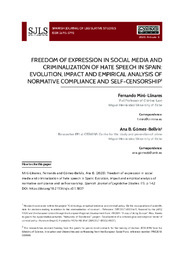Por favor, use este identificador para citar o enlazar este ítem:
https://hdl.handle.net/11000/5993Registro completo de metadatos
| Campo DC | Valor | Lengua/Idioma |
|---|---|---|
| dc.contributor.author | Miró Llinares, Fernando | - |
| dc.contributor.author | Gómez Bellvís, Ana B. | - |
| dc.contributor.other | Departamentos de la UMH::Ciencia Jurídica | es |
| dc.date.accessioned | 2020-05-06T07:59:14Z | - |
| dc.date.available | 2020-05-06T07:59:14Z | - |
| dc.date.created | 2019 | - |
| dc.date.issued | 2020-05-06 | - |
| dc.identifier.issn | 26955792 | - |
| dc.identifier.uri | http://hdl.handle.net/11000/5993 | - |
| dc.description.abstract | The popularization of social media as a forum for the expression of ideas and for political debate has increased in recent years the, always present, tension between freedom of expression and public control of offensive or dangerous speech. Many democratic states criminalise hate speech and other types of offensive expression, and now are social Media themselves that can exercise prior censorship over content on the basis of similar rules but much more restrictive and ambiguous. Combining normative analysis with empirical methodologies, this paper analyses, focusing on Spain, the implications that Criminal laws and "community guidelines" have on citizens' decisions to express themselves freely, which is fundamental for the configuration of a real democracy. It is made up of two studies: the first traces the evolution of judicial resolutions in Spain that prosecute possible crimes of terrorism and hate for political expression on social networks, as a result of the popularisation of these since 2014 in concurrence with a broad and ambiguous legislation. The results show a significant growth of state control over expressions that are essentially offensive but that, in most cases, do not represent a clear and present danger and could go beyond the doctrine of the ECHR. In the second part, an empirical study is carried out to analyse how the existence of hate speech crimes and social media rules affects the decision to express political ideas on social networks or to self-censor. The results show that a large part of the sample is self-censoring but that criminal law and content rules, in particular the severity of the law and the certainty that it is applied, do not have a direct effect on the decision to express ideas on the Internet, while the social perception of what others do is decisive. It is discussed how this calls into question the legitimacy of the evident limitation of freedom of expression of some crimes in Spain | es |
| dc.format | application/pdf | es |
| dc.format.extent | 42 | es |
| dc.language.iso | eng | es |
| dc.rights | info:eu-repo/semantics/openAccess | es |
| dc.subject | social networks | es |
| dc.subject | freedom of speech | es |
| dc.subject.other | CDU::3 - Ciencias sociales::Derecho: 34 | es |
| dc.title | Freedom of expression in social media and criminalization of hate speech in spain: evolution, impact and empirical analysis of normative compliance and self-censorship | es |
| dc.type | info:eu-repo/semantics/article | es |
| dc.identifier.doi | 10.21134/sjls.v0i1.1837 | - |
| dc.relation.publisherversion | http://doi.org/10.21134/sjls.v0i1.1837 | - |

Ver/Abrir:
Miró Llinares, F..pdf
859,63 kB
Adobe PDF
Compartir:
 La licencia se describe como: Atribución-NonComercial-NoDerivada 4.0 Internacional.
La licencia se describe como: Atribución-NonComercial-NoDerivada 4.0 Internacional.
.png)